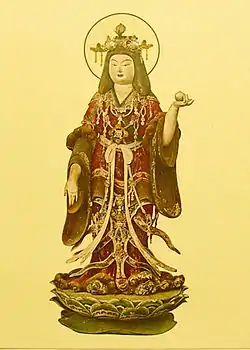吉祥天
Japanese
Etymology 1
| Kanji in this term | ||
|---|---|---|
| 吉 | 祥 | 天 |
| きち Grade: S |
しょう > じょう Grade: S |
てん Grade: 1 |
| goon | kan’on | on’yomi |
| Alternative spelling |
|---|
| 吉祥天 (kyūjitai) |
From Middle Chinese 吉祥天 (MC kiɪt̚ zɨɐŋ tʰen), possibly as a shortening of 吉祥天女 (MC kiɪt̚ zɨɐŋ tʰen ɳɨʌX), a translation of Sanskrit श्रीमहादेवी (śrīmahādevī, literally “great goddess of wealth and prosperity”).[1][2][3]
Analyzable as a compound of 吉祥 (kichijō, “auspicious sign, good omen”) + 天 (ten, “heavens”).[4]
Pronunciation
- IPA(key): [kʲit͡ɕiʑo̞ːtẽ̞ɴ]
Proper noun
吉祥天 • (Kichijōten)
Etymology 2
| Kanji in this term | ||
|---|---|---|
| 吉 | 祥 | 天 |
| きつ > きっ Grade: S |
しょう Grade: S |
てん Grade: 1 |
| kan’on | on’yomi | |
| Alternative spelling |
|---|
| 吉祥天 (kyūjitai) |
(This etymology is missing or incomplete. Please add to it, or discuss it at the Etymology scriptorium.)
Compound of 吉祥 (kisshō, “auspicious sign, good omen”) + 天 (ten, “heavens”).[4]
Pronunciation
- IPA(key): [kʲiɕːo̞ːtẽ̞ɴ]
Proper noun
吉祥天 • (Kisshōten)
See also
- 毘沙門天 (Bishamonten, “Buddhist depiction of Vaisravana”)
- 如意宝珠 (Nyoi Hōju)
- 施無畏印 (semui-in)
References
- “吉祥天”, in ブリタニカ国際大百科事典 小項目事典 (Buritanika Kokusai Dai Hyakka Jiten: Shō Kōmoku Jiten, “Encyclopædia Britannica International: Micropædia”) (in Japanese), Tōkyō: Britannica Japan Co., Ltd., 2014
- 2006, 大辞林 (Daijirin), Third Edition (in Japanese), Tōkyō: Sanseidō, →ISBN
- 1995, 大辞泉 (Daijisen) (in Japanese), Tōkyō: Shogakukan, →ISBN
- 1988, 国語大辞典(新装版) (Kokugo Dai Jiten, Revised Edition) (in Japanese), Tōkyō: Shogakukan
This article is issued from Wiktionary. The text is licensed under Creative Commons - Attribution - Sharealike. Additional terms may apply for the media files.
